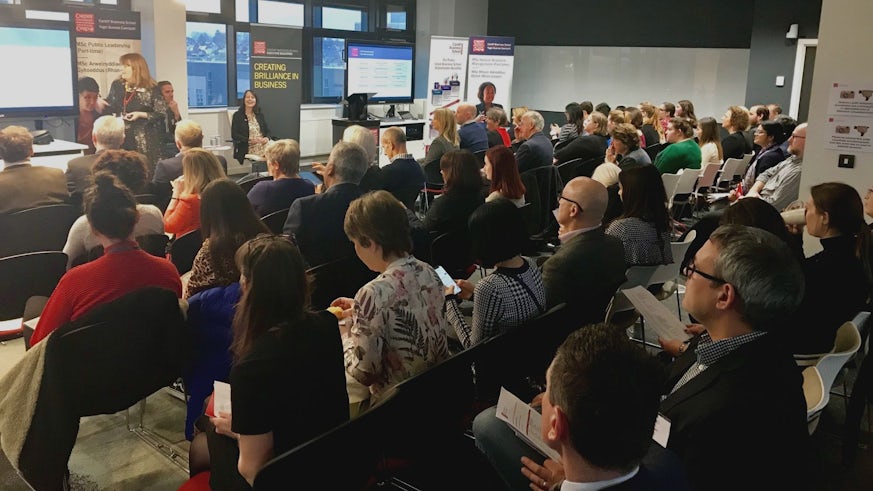Rare, brief and non-recurrent
4 April 2019

A leading expert in the field of housing and homelessness and the Chief Executive of Wales' leading homelessness charity for young people and vulnerable women led the latest event in our Cardiff Business School’s Breakfast Briefing Series.
Dr Peter Mackie, Reader at Cardiff University’s School of Geography and Planning, and Frances Beecher explained to a full suite of attendees what is working and some of the solutions that are currently emerging to tackle homelessness in Wales.
After introductions by Sarah Lethbridge, Director of Executive Education at Cardiff Business School and event Chair Helen Beddow, Deputy Head of Marketing at Cardiff University, Dr Mackie got proceedings underway.
Homelessness trends

He showed through a series of graphs and statistics how homelessness in Wales is a problem that we are failing to address.
Dr Mackie, said: “Homelessness is a problem we have failed to address. I think the reason you’re all here is because homelessness is visibly growing in our city.”
In a presentation that covered poverty, housing failure, institutional failure, relations and experiences, Dr Mackie outlined the causes of homelessness.
He explained how the goal is to make homelessness ‘rare, brief and non-recurrent’, but in order to do so we need to understand the causes.

“Poverty is statistically proven to be the major underlying cause of homelessness, it precedes homelessness. And, particularly, poverty in childhood. If we address poverty in childhood, we’ll see a real drop in the number of people facing homelessness.”
Leading the way
Dr Mackie continued by explaining how Wales are leading the way, from a legislative prospective, in tackling homelessness.
He outlined The Housing (Wales) Act 2014 which gives homeless people and those at risk of homelessness in Wales support from councils who have a duty to help secure or keep accommodation.
While this works in approximately 60% of cases, Dr Mackie stressed that more can be done.
Before handing over to Frances Beecher, Dr Mackie shared an early intervention programme from Geelong, Australia called ‘Upstream’ where the risk of youth homelessness is identified in schools through interviews and surveys. Young people are then supported in their lives and homelessness is prevented.
Prevention to support
Ms Beecher began her presentation by describing the work that Llamau does for young people and women in Wales.
“We have European-leading youth outcomes that prevents young people going into homelessness and ending up on the streets and we are very proud of that,” she said.

But as Ms Beecher explained, people become homeless for a huge variety of reasons. So Llamau seeks to both prevent as well as move people away from homelessness through a series of early intervention, gender-specific, skills-based and health and wellbeing focused programmes.
She described how Llamau strives to create a sense of home in the environments in which they deliver their services.
“Llamau does not run hostels. Llamau does not run institutions. We work with people in home environments and that has been proven time and time again to be the most effective way. It gives a sense of belonging, a sense of security, a place to settle.
“And that’s the bedrock of delivering high-quality services,” Ms Beecher added.
Fulfil potential and move forward
In addition to the issues raised by Dr Mackie, Ms Beecher shared some of the issues faced by the women and young people Llamau works with. Experience of the care system, domestic abuse, mental ill health and lack of financial support or debt are among the most common of these.
Llamau has adopted a PIE-2 model which is informed by physiological theory and evidence relating to trauma. Through five steps, Llamau seek to support individuals to fulfil potential and move forward.
- Creating security
- Making sense together
- Developing skills
- Experiencing new journeys
- Moving ono the next adventure
Business and charity
Ms Beecher closed proceedings by outlining the benefits of business working together with charity and how collaboration can yield opportunities for all parties.

“Through our partnerships, the world of business has opened up for the people we are working with. They no longer see people who have been homeless as ‘other’. They see them as the same as you and I. For me, that is what really matters.”
The Executive Education Breakfast Briefing series is a network that enables business contacts to find out more about the latest research and key developments from industrial partners. Please join our community.
If you were unable to attend, catch up with this live stream of the event.
Share this story
Enabling our business contacts to find out more about latest business research and key developments from industry partners and practitioners.




